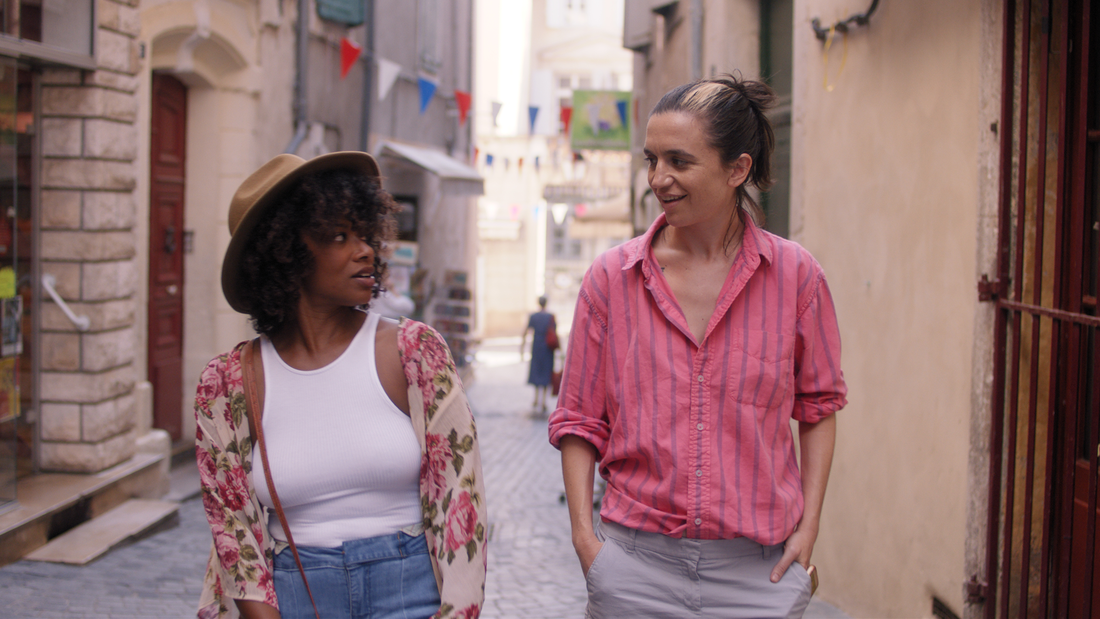|
Idella Johnson and Hannah Pepper in Ma Belle, My Beauty (2021) Time. It’s the one thing we can’t make more of. When the passing of time is truly felt, the response can be incredibly emotional…full of longing. Mourning missed opportunities. The longing for a meaningful, everlasting human connection takes on different manifestations in Ma Belle, My Beauty. The debut feature film, written and directed by New Orleans filmmaker Marion Hill, explores the residue of a break up in a queer polymerous relationship. Bertie (Idella Johnson) and Lane (Hannah Pepper) used to live together in New Orleans. After a falling out, Lane disappeared for two years. Bertie got married to their shared partner Fred (Lucien Guignard) and moved to the South of France, where the film is set. Out of the blue, upon Fred’s invite and unbeknownst to Bertie, Lane shows up at their beautiful villa with a front row view to the couple’s fancy new musical life. Bertie is in a rut, creatively and personally. Now with Lane back in the picture, Fred hopes the spark they once shared can reignite her passion as a performer.
Amidst the al fresco dinners and breezy summer vibes is a complicated surprise reunion. Marion Hill captures romantic tension well. She shows the ease with which passionate feelings can be reignited from a single look or a meeting. Ma Belle, My Beauty unearths the emotional baggage of a once hopeful, promising relationship. So much of the film is about yearning. Bertie and Lane, presently on two completely different tracks in life, navigate through the aftermath of a relationship. Pining glances, rekindled admiration, bottled up confusion, and tense conversations map out the fact that these characters have a history. But where the film loses its compelling ingredient is in actually creating and fleshing out a history for the characters. While there are intriguing themes at play about longing for what was lost, not enough time is given to establishing who Bertie and Lane are beyond the relationship that ties them together. Bertie in particular is often trying to carve out her own path, instead of being whoever everyone else wants her to be. Everyone around her seems to want a piece, and the film skirts over crafting a well developed character that shows more insight into her individuality. There are plenty of enigmatic glances with the promise of an elaboration that never really arrives. The more Hill’s story stretches out, the more emotional investment wanes and the cracks in a promising foundation begin to appear. Longing manifests in different ways; there’s Bertie, who doesn’t feel happy in the situation she’s in. She carries understandable frustration from essentially being ghosted by her partner. She has an intriguing scene with Lane on the conversation of happiness not being tied to her, nor Fred. But there’s a missed opportunity in not delving further into Bertie’s point of view; wonderful as Idella Johnson is playing Bertie, both acting and singing-wise, her character feels underwritten and often in service of other characters. Then there’s Lane, single and reminiscing on the reasons why. She carries a pang of regret from leaving and not keeping in touch with Bertie, thus missing out on life events she otherwise would have been there for. A crucial space the film doesn’t fill is the exploration of Lane leaving; it becomes the source to which the protagonists often return when they find moments of connecting with their past. The film relies a lot on what’s left unsaid between two people, and how this often manifests through physical yearning. Though what’s left unsaid doesn’t always provide an insightful or compelling window into who the characters are. Johnson, along with Hannah Pepper who plays Lane, bring great subtlety and quiet moments of contemplation to life. But their performances ultimately feel inhibited by a screenplay working often on brisk presumptions. The carefree quality that works to the film’s disadvantage is also what makes it refreshing in other respects. There’s a lightheartedness in Marion Hill’s approach to the story and atmosphere. Ma Belle, My Beauty captures the breezy feeling of summertime. Lauren Guiteras’ cinematography gives a beautiful glow to the film. The soundtrack evokes an easygoing atmosphere, perhaps a little too much in this direction given the dramatic climax that Hill tries to go for. While uneven in direction at times, Hill strongly conveys the feeling of throwing caution to the wind. So much of the film operates on physicality, whether it’s fleeting glances or moments of intimacy. A lot is happening on the surface, without really delving into detail about reasoning. Hill strikes a strong parallel to the character of Lane, described by Bertie as the type of person who will enter someone’s life, mess things up, and leave behind remnants of emotional baggage. Without worrying about the effects her leaving would have on Bertie’s wellbeing, Lane fuels a sense of tension. The space between them only intensifies with the passing of time, and what comes with it is the loss that they’ll never get that time back. Ma Belle, My Beauty explores the ease with which two people can go in totally different directions when there’s been a distance between them, both physically and emotionally. There’s a refreshing aspect to the way Hill maps out the story, that she doesn’t provide a bowtie ending where all hope is restored and the stars align again. Instead, she poses the question of whether the stars were aligned in the first place. The protagonists can’t simply pick up where they left off, which makes for a potentially interesting narrative that doesn’t get to really soar. So much of the film is spent wondering about the characters’ intentions and finding a way to get to know them better. Left behind is the longing to spend more time with them.
0 Comments
Leave a Reply. |
Archives
June 2024
Categories |


 RSS Feed
RSS Feed